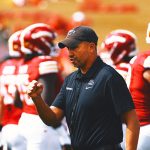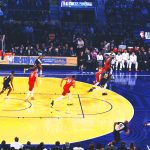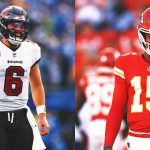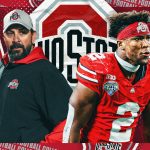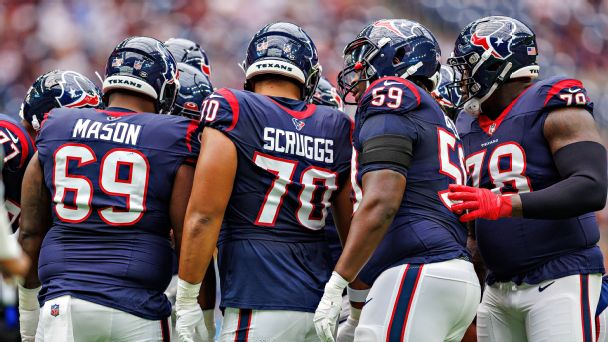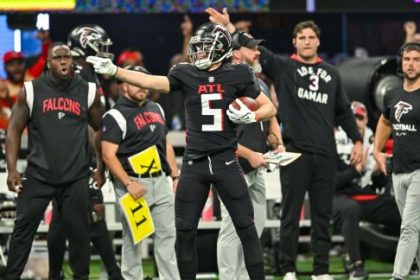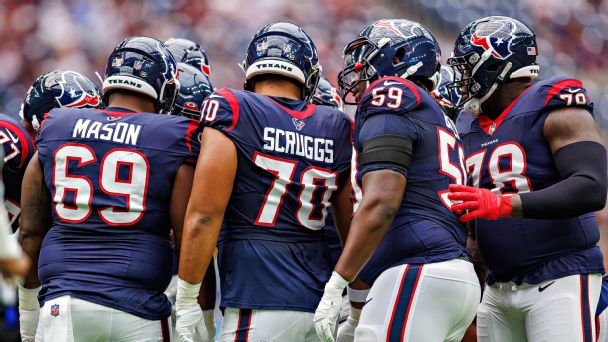
HOUSTON — The Houston Texans made it clear heading into the draft that no matter who the quarterback was, he would be better protected than some of their past first-round picks.
There have been three first-round quarterback selections in the Texans’ history. First came David Carr — the franchise’s first-ever draft pick in 2002. Then in 2017, Houston took Deshaun Watson with the 12th pick. In April, C.J. Stroud was selected to take the reins, as Houston selected him with the No. 2 pick.
The Texans have made it a point of emphasis to not let happen to Stroud what happened to Carr and Watson.
“I think my last year in college, I don’t know how many times I was sacked, but it was maybe 15 the entire year,” Carr told ESPN. “Then I go from that to 15 in the first two games [with the Texans]. Man, it was really difficult. It got to that point during my rookie year where I felt it was almost insurmountable.”
During Carr’s rookie year, the No. 1 overall pick was sacked 76 times — the most ever for a single season — after being sacked only 58 times total in college. Watson was sacked 62 times (the fifth most) in his second season, his first full season as a starter.
So on March 14, general manager Nick Caserio began to invest in the offensive line, first by trading a sixth-round pick to the Tampa Bay Buccaneers for right guard Shaq Mason. Five days later, Caserio gave left tackle Laremy Tunsil a three-year, $75 million contract extension, making him the highest-paid offensive lineman in NFL history.
“If you want to be a great offense, you got to have a great protector at the left tackle position,” coach DeMeco Ryans said, “and that’s what Laremy provides for us.”
Caserio then traded the Nos. 65, 188 and 230 picks to the Philadelphia Eagles to move up three spots in the second round to select Penn State center Juice Scruggs.
Then, in May, Caserio signed Mason to a three-year, $36 million extension and extended right tackle Tytus Howard to a three-year, $56 million extension.
Tunsil, Howard and Mason’s extensions added up to $118.5 million in guaranteed money, the most since 2019 when the Eagles gave out $122.4 million of guaranteed money with extensions to five players — which was highlighted by right tackle Lane Johnson‘s $54.6 million, according to ESPN Stats & Information.
“Once we get rolling, this [offense], it’s going to be special,” Mason told ESPN. “We’ll be very key to [Stroud’s] development. We invested in our O-line, and we’re expected to deliver, which is what we plan on doing. I think that also makes the game easier for him, knowing the stability up front. He’s going into every week knowing, ‘OK, I know what I’m getting.’ That makes him relax more and just lets him play his game.”
However, transitioning from reading college defenses to NFL units can be difficult for rookies.
Since 2011, 546 rookie quarterbacks have made starts. When they faced pressure, they had a 13.9 QBR. And in college, when Stroud saw pressure, he had a 38 QBR.
When rookies weren’t pressured, they had a QBR of 60.8. Stroud, during his last two seasons when not pressured, came in at 92. The only player with a higher QBR was 2022 Heisman winner Caleb Williams (93) out of USC.
“When we went and drafted C.J. — he’s a great quarterback — and for him to take care of the offensive line the way that he did this offseason, it’s a big standard for us,” Howard said. “We’ve got to go out there and do what we’ve been paid to do, which is protect him and make him the most comfortable quarterback in the NFL this year, so he can just go out there and win us some games.”
In the first preseason game against the New England Patriots, Stroud was under heavy pressure without Howard, Tunsil and Mason.
Stroud was pressured on three of his five dropbacks in his introduction to the NFL. It started on his second dropback when defensive tackle Daniel Ekuale barreled down on him for a sack.
Stroud finished 2-of-4 for 13 yards with an interception and the sack.
Carr remembers talking to his wife during his rookie year about how the beating “weighed on [his] confidence” and made him wonder, “Is it ever going to get better?”
But his experience allows him to speak to young quarterbacks and the challenges they might face.
“From a mental preparation standpoint, I didn’t have enough experience picking up these blitzes,” Carr said. “A lot of this stuff was on me to diagnose the blitzes and set the protections correctly. I was cranking away as hard as I could, but I was not ready yet.
“I would not put another rookie quarterback in the same situation schematically. … As soon as teams figured out that I was in charge of all the protections, here comes every exotic play you’ve ever seen in your life.”
The current version of the Texans’ offensive line has been hit with injuries, however. Houston placed left guard Kenyon Green, a 2022 first-round pick, on injured reserve after he suffered a shoulder injury during the third preseason game, and he will miss the entire season. Scruggs was also placed on injured reserve, and he will miss at least the first four games.
To combat the injuries, Caserio made two trades in late August. The first one was sending a 2024 fifth-round pick to the Arizona Cardinals for offensive tackle Josh Jones and a 2024 seventh-round pick, and the second involved sending a 2025 sixth-round pick to the Pittsburgh Steelers for center Kendrick Green.
Still, the season opener on Sept. 10 (1 p.m. ET, CBS) at the Baltimore Ravens will be the team’s first real test.
“The offensive line is important, no matter who is playing at quarterback,” Ryans said. “… You want to make sure he has great protection up front. It will always be a high priority to me amongst the offensive and defensive line because I feel like that’s how you win games. It starts up front, and that will never change. Try to go out with a subpar [offensive] line or a subpar [defensive] line, you’re going to be in for a long day. So, it will always start there for me.”

